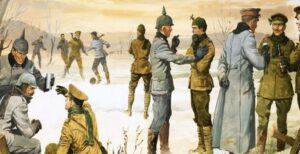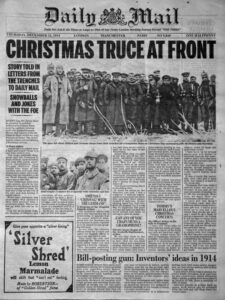
It all started with soldiers singing carols in the trenches.
According to the American poet, Henry Wadsworth Longfellow, “Music is the universal language of mankind”. Music brings people together. It can break through barriers of all kinds – linguistic, political, ideological – and can provide an inroad to communication and understanding.
The power of music to overcome human obstacles is evident in one of my favourite stories for this season: the 1914 Christmas Eve Truce during WWI.

About 100,000 British and German soldiers were involved in this informal cessation of hostilities along the Western Front. On Christmas eve, the artillery fell silent. The Germans placed candles on their trenches and on Christmas trees, and then continued their celebration by singing carols. The British responded by singing carols of their own, and the two sides shouted Christmas greetings to each other.
On Christmas day in many areas along the Front, the soldiers ventured into No Man’s Land to exchange gifts of food and tobacco, and souvenirs such as buttons and hats. There were even reported games of football between the two sides.
One of the Christmas carols that is shared by both the English and German cultures is Silent Night. The staff at students at DoReMi send you holiday greetings, and our wish for the world to have another silent night.
